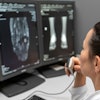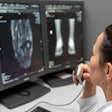The American Medical Association (AMA) has adopted its first policy recommendations on the use of augmented intelligence -- also known as artificial intelligence (AI) -- in healthcare.
In an announcement made at this week's annual meeting in Chicago, the AMA said it will do the following:
- Leverage its ongoing engagement in digital health and other priority areas for improving patient outcomes and physicians' professional satisfaction to help set priorities for healthcare AI
- Identify opportunities to integrate the perspective of practicing physicians into the development, design, validation, and implementation of healthcare AI
- Promote the development of thoughtfully designed, high-quality, clinically validated healthcare AI that is designed and evaluated in keeping with best practices in user-centered design, particularly for physicians and other members of the healthcare team; is transparent; conforms to leading standards for reproducibility; identifies and takes steps to address bias and avoids introducing or exacerbating healthcare disparities, including when testing or deploying new AI tools on vulnerable populations; and safeguards patients' and other individuals' privacy interests and preserves the security and integrity of personal information
- Encourage education for patients, physicians, medical students, other healthcare professionals, and health administrators to promote greater understanding of the promise and limitations of healthcare AI
- Explore the legal implications of healthcare AI, such as issues of liability or intellectual property, and advocate for appropriate professional and governmental oversight for safe, effective, and equitable use of and access to healthcare AI
The AMA said that AI systems need to be developed and evaluated in keeping with best practices in user-centered design. The focus must be on the needs of users, and system usability should be tested by a demographically representative set of end users, according to the association.
"To reap the benefits for patient care, physicians must have the skills to work comfortably with healthcare AI," said Dr. Jesse Ehrenfeld, an AMA board member, in a statement. "Just as working effectively with [electronic health records] is now part of training for medical students and residents, educating physicians to work effectively with AI systems, or more narrowly, the AI algorithms that can inform clinical care decisions, will be critical to the future of AI in healthcare."



















